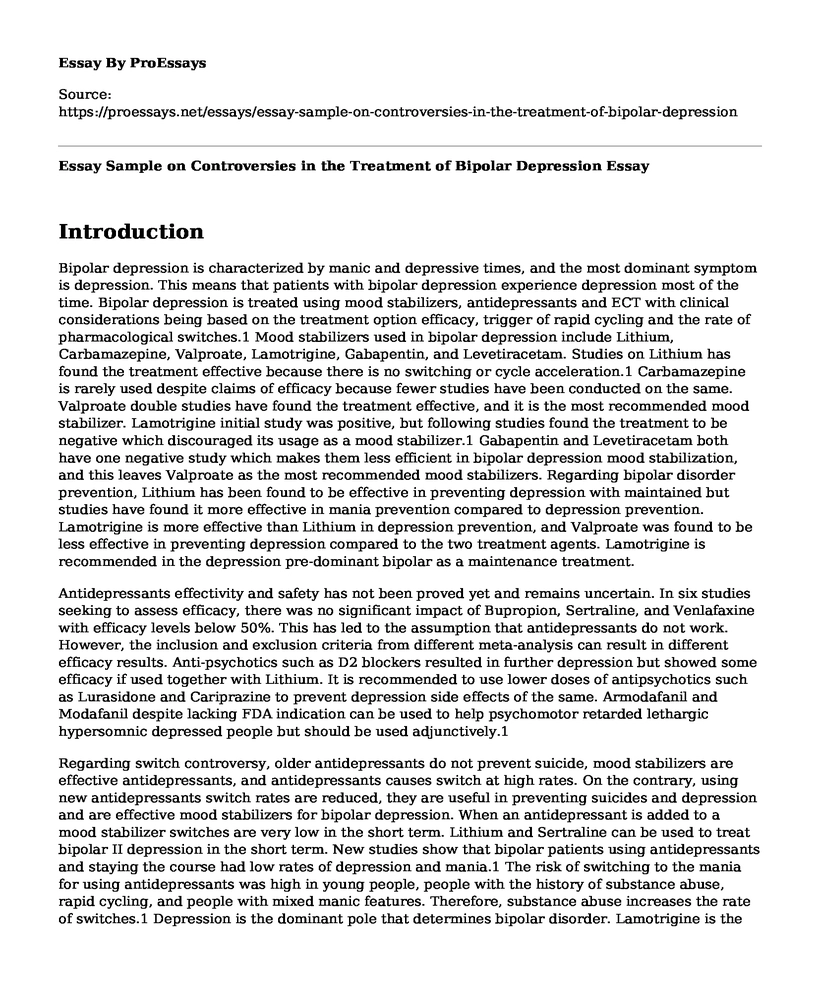Introduction
Bipolar depression is characterized by manic and depressive times, and the most dominant symptom is depression. This means that patients with bipolar depression experience depression most of the time. Bipolar depression is treated using mood stabilizers, antidepressants and ECT with clinical considerations being based on the treatment option efficacy, trigger of rapid cycling and the rate of pharmacological switches.1 Mood stabilizers used in bipolar depression include Lithium, Carbamazepine, Valproate, Lamotrigine, Gabapentin, and Levetiracetam. Studies on Lithium has found the treatment effective because there is no switching or cycle acceleration.1 Carbamazepine is rarely used despite claims of efficacy because fewer studies have been conducted on the same. Valproate double studies have found the treatment effective, and it is the most recommended mood stabilizer. Lamotrigine initial study was positive, but following studies found the treatment to be negative which discouraged its usage as a mood stabilizer.1 Gabapentin and Levetiracetam both have one negative study which makes them less efficient in bipolar depression mood stabilization, and this leaves Valproate as the most recommended mood stabilizers. Regarding bipolar disorder prevention, Lithium has been found to be effective in preventing depression with maintained but studies have found it more effective in mania prevention compared to depression prevention. Lamotrigine is more effective than Lithium in depression prevention, and Valproate was found to be less effective in preventing depression compared to the two treatment agents. Lamotrigine is recommended in the depression pre-dominant bipolar as a maintenance treatment.
Antidepressants effectivity and safety has not been proved yet and remains uncertain. In six studies seeking to assess efficacy, there was no significant impact of Bupropion, Sertraline, and Venlafaxine with efficacy levels below 50%. This has led to the assumption that antidepressants do not work. However, the inclusion and exclusion criteria from different meta-analysis can result in different efficacy results. Anti-psychotics such as D2 blockers resulted in further depression but showed some efficacy if used together with Lithium. It is recommended to use lower doses of antipsychotics such as Lurasidone and Cariprazine to prevent depression side effects of the same. Armodafanil and Modafanil despite lacking FDA indication can be used to help psychomotor retarded lethargic hypersomnic depressed people but should be used adjunctively.1
Regarding switch controversy, older antidepressants do not prevent suicide, mood stabilizers are effective antidepressants, and antidepressants causes switch at high rates. On the contrary, using new antidepressants switch rates are reduced, they are useful in preventing suicides and depression and are effective mood stabilizers for bipolar depression. When an antidepressant is added to a mood stabilizer switches are very low in the short term. Lithium and Sertraline can be used to treat bipolar II depression in the short term. New studies show that bipolar patients using antidepressants and staying the course had low rates of depression and mania.1 The risk of switching to the mania for using antidepressants was high in young people, people with the history of substance abuse, rapid cycling, and people with mixed manic features. Therefore, substance abuse increases the rate of switches.1 Depression is the dominant pole that determines bipolar disorder. Lamotrigine is the most effective mood stabilizers, but antipsychotics are effective too in mood-stabilizing of patients with bipolar disorder. Antidepressants efficacy in bipolar depression shows weak data with the SSRIs having the lowest switch rates.
Reference
Department of Psychiatry & Behavioral Sciences, Grand Rounds. Michael Gitlin, M.D., "Controversies in the Treatment of Bipolar Depression" presented on April 06, 2018. https://www.youtube.com/watch?v=p4WY8p4N41g&feature=youtu.be. Accessed January 10, 2019.
Cite this page
Essay Sample on Controversies in the Treatment of Bipolar Depression. (2022, Nov 19). Retrieved from https://proessays.net/essays/essay-sample-on-controversies-in-the-treatment-of-bipolar-depression
If you are the original author of this essay and no longer wish to have it published on the ProEssays website, please click below to request its removal:
- Paper Example on Personal Strengths and Challenges and Plan of Action Task Elements
- Essay Sample on Writing Skills
- Essay Sample on Van der Kolk and Psychology
- Essay Sample on My True Color Description
- Mental Health: Comp. Study of Players vs Non-Players - Essay Sample
- Essay Example on Living in 21st Century: Stress, Resilience, & Transitions
- Report Example on Neuroscience & Psychotherapy







